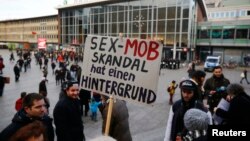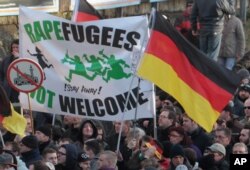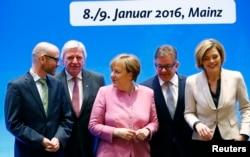German officials say nearly all the suspects for a rash of attacks on women in Cologne on New Year's Eve were "of foreign origin."
Ralf Jaeger, the interior minister from the state of North Rhine-Westphalia, said Monday, based on police reports and eyewitness accounts, that "all signs point" to the suspects "being North Africans and people from the Arab world."
He said that 19 suspects are currently being investigated, including 14 men from Morocco and Algeria. Ten of the suspects are asylum seekers, nine of whom arrived in Germany after September 2015.
Tensions are running high in Cologne with more than 500 reports from women about the assaults. Around 1,000 men are said to have surrounded, harassed and sexually assaulted women, many of whom were also robbed of their belongings, in front of Cologne's main train station on New Year's Eve.
Two Pakistanis and a Syrian were injured in separate attacks Sunday by mobs in Cologne. Police say a group of about 20 people late Sunday attacked six Pakistanis, two of whom had to be hospitalized. A short time later, a group attacked and injured a Syrian man.
Spotlight on asylum seekers
On Saturday, riot police dispersed a rally of the anti-Islam PEGIDA movement in Cologne.
The attacks and "retaliation" attacks have placed the spotlight on the 1.1 million asylum seekers who arrived in Germany last year, sparking debates about tougher laws for migrants.
German Chancellor Angel Merkel on Saturday proposed changes to German law that would make it easier to deny asylum to refugees convicted of crimes.
"The right to a residence status and an asylum procedure can be lost if someone is convicted, on probation or jailed," Merkel told reporters after a meeting of her conservative Christian Democratic Party.
Both Justice Minister Maas and Chancellor Angela Merkel have condemned the assaults and called for the perpetrators to be punished.
Police in the German cities of Hamburg and Stuttgart have said similar crimes were committed during New Year's Eve festivities, but to a lesser extent.
The assaults have intensified the debate over Germany's immigration policies.








